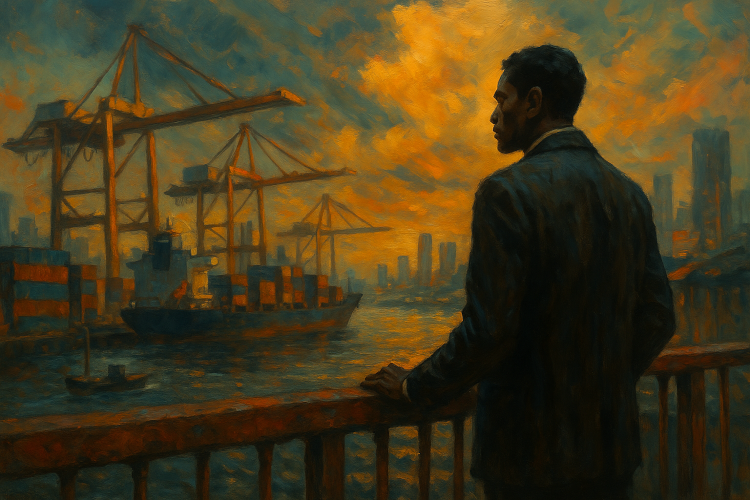Not Another Politician: Why the World Needs New Leaders
As global powers redraw trade lines, smaller nations face a reckoning. Behind flashy infrastructure deals and tariff battles lies a deeper erosion of sovereignty. This editorial calls for a new kind of leadership—one unbought, unbound, and unafraid to disrupt the global status quo.

In the evolving landscape of international trade, the concept of neutrality is becoming increasingly untenable. The recent revelation by South Korea’s customs authorities—uncovering attempts to mislabel Chinese goods as South Korean to bypass U.S. tariffs—signals a deepening complexity in the geopolitical chessboard. It’s no longer just about trade; it’s about survival in an emerging world order where lines are being drawn not in sand, but in steel, silicon, and debt.
This incident is not isolated. As the United States, under a more assertive economic doctrine, reimposes high tariffs on Chinese imports, pressure is mounting globally. Countries, especially those economically entangled with China, are being asked to pick sides. China has not hesitated to retaliate—issuing warnings against nations supporting U.S.-led trade isolation and signaling an era of strategic backlash.
But this isn’t a story about China versus America. It’s about the shrinking space for national autonomy.
For countries deeply integrated into China’s infrastructure and financial ecosystem—through programs like the Belt and Road Initiative—the stakes are existential. Take, for example, nations that have become dependent on Chinese funding for energy grids, ports, and highways. These megaprojects, while dressed in the language of development, often come with contracts that prioritize Chinese contractors, labor, and material, leaving local economies with little but debt and diminishing control.
Yet, pivoting too visibly toward the West isn’t a viable solution either. Doing so risks diplomatic fallout and capital flight. And so, many nations attempt a balancing act—professing non-alignment while quietly playing both sides. But in today’s bifurcated global economy, where trade is being weaponized and loyalty scrutinized, such ambiguity no longer holds.
This polarization—economic blocs forming around diverging models and ideologies—isn’t just slowing globalization. It’s reshaping it. We are witnessing the emergence of a more regional, slower, and potentially more sustainable trade model. One that prioritizes near-shoring and supply chain sovereignty. Ironically, the deceleration of global trade might just be what the environment and over-leveraged economies need.
But here's the bitter truth: most current leaders are not equipped for this moment.
What the world needs now isn’t another politician navigating optics or playing incremental reform. It needs something radically different. A new archetype of leadership:
- A system disruptor, who isn’t trying to manage broken models but redesign them;
- A truth-teller, unafraid to confront elites, foreign pressures, or corporate monopolies;
- A post-ideological realist, grounded in moral clarity but flexible in methods;
- An unaffiliated voice, unswayed by party lines, donor dollars, or foreign influence;
- A technologically literate guardian, aware that today’s sovereignty also lives in data centers and digital infrastructure;
- A courage-driven visionary, who can’t be bought off, silenced, or paraded as a mascot for the status quo.
This isn’t romanticism—it’s necessity. Because the stakes are too high to leave the future in the hands of those treating debt like diplomacy and foreign leverage like investment.
The illusion that foreign-funded development is inherently good must be interrogated. Too often, these projects serve the geopolitical goals of their financiers—not the long-term wellbeing of the host nations. When infrastructure, digital systems, or supply chains fall under foreign control, national policy becomes a puppet of global chess moves. Sovereignty, in such a landscape, is little more than theater.
We must also question the role of working- and middle-class citizens in this equation. If the benefits of growth are concentrated among elites and foreign shareholders, while wages stagnate and household debt rises, then this is not inclusive development—it is economic extraction, repackaged.
And so, the way forward cannot be paved with policy tweaks or more photo-op diplomacy. It requires a philosophical and structural reckoning. Nations must invest in self-sufficiency, industrial policy, and a serious reduction in external dependencies—whether financial, technological, or infrastructural.
It also requires public courage. The kind of courage that sees through empty promises and is willing to say no, even when the price of defiance is high. The leader who can embody this courage isn’t likely found in a gilded parliament or a global summit. They are likely still emerging—shaped by frustration, clarity, and a refusal to play the old games.
Until such leaders rise—and are supported by the people who refuse to be passive pawns in global power plays—we will remain stuck in cycles of dependency, denial, and diminishing returns.
The global order is shifting. And the future belongs not to the loyal, but to the lucid.